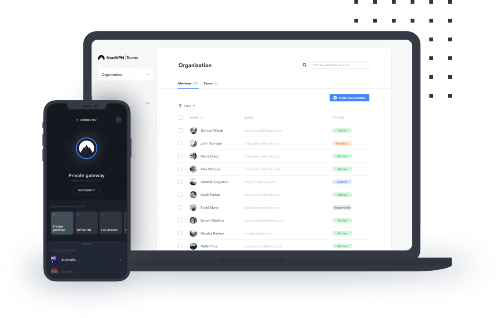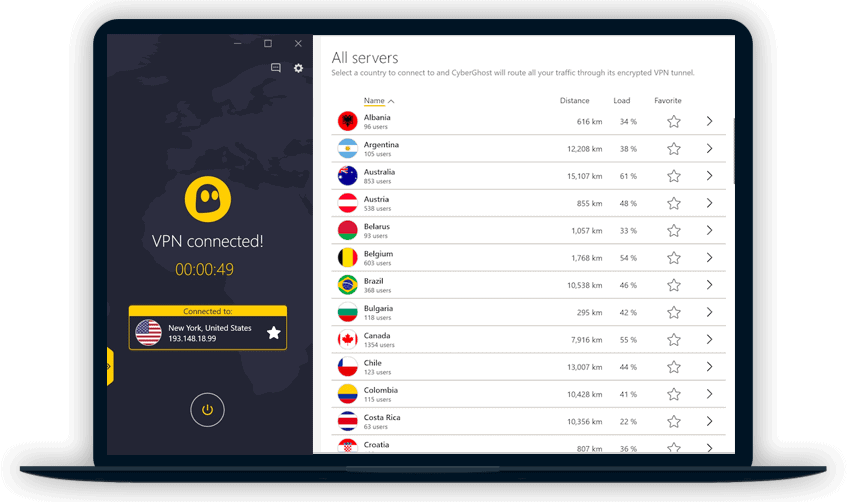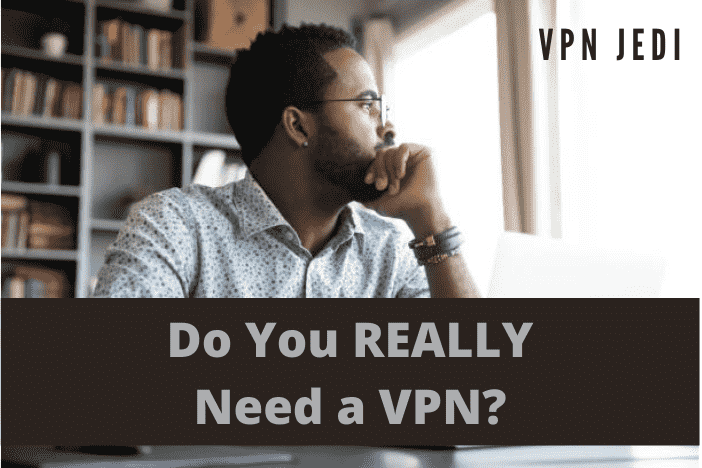VPNs are one of those things a lot of people are not entirely convinced they need. Until they realize they do. But for anyone who is concerned about their privacy and security on the internet, then it really is a no-brainer.
I have carried out intensive and comprehensive tests on VPNs. So you should believe me when I say that everybody who has access to the internet should get a VPN. Let me show you why.
Why Do You Need a VPN?
VPNs grant you access to the internet while protecting you under armor that doubles as an invisibility cloak. They have you covered whether you are concerned about staying private and undetected, bypassing geo-block restrictions to gain access to movies, shows, and music, protecting your personal data, accessing blocked websites or evading government censorship restrictions.
VPNs Keep You Private and Secure
A VPN provides a safe and secure tunnel for your data to travel over an internet connection. This tunnel is encrypted and what this means is that no one else but yourself is able to see or access the data you send and receive.
Every time you go on the internet, your data is at risk of being set upon and stolen by different agents like hackers, scammers, the government, and identity thieves. Encryption scrambles your data, making it invisible or intelligible to any prying eyes.
This safety net covers everything you do on the internet while using a VPN service, including shopping, online banking, and log-ins to social media platforms. Even if you connect to the internet on public Wi-Fi, you will still have your sensitive information protected.
VPNs Evade Monitoring
All sorts of agents try to monitor every activity you carry out over the internet, for various reasons which may not be ideal for you. Major internet institutions like Google and Facebook will try to monitor your activity with trackers so they can push ads to you. Your ISP wants to know how much data you are using, so it can slow down your internet connection.
Nefarious entities like hackers, scammers, and identity thieves want to be able to slide you malware or steal your data, and then there are actually companies who set up dossiers on you, gathering pertinent information they can sell to the highest bidders.
Sounds scary, huh? Regardless, it is the reality of the internet age, and that’s why you need a VPN. A VPN will help you to avoid these monitoring and tracking agents, by making you entirely anonymous to them.
VPNs Bypass Geo-blocks
Geo-blocking is a technology that restricts access to internet content based upon a geographical location. Many websites, streaming, and content platforms lock their content and libraries to specific regions or locations, preventing people who are outside of those regions from gaining access to them. This can be due to licensing and copyright issues.
What a VPN does is help you evade these restrictions by obscuring your IP address, granting you a temporary new IP address, connecting you to a server in a different location, and hence tricking these websites or streaming platforms into believing you are from a different territory than you actually are.
Your internet service provider (ISP) also gets tricked, and so it is unable to throttle your connection speeds after you carry out data-heavy tasks such as binge-watching TV shows or torrent downloading and P2P sharing.
VPNs avoid Government Censorship
Government censorship on the internet is becoming more rampant. This censorship goes against two very important ideals that founded the internet – freedom, and openness. Governments in several countries around the world restrict, to varying extents, what can be accessed on the internet by their citizens.
Countries like China, Iran, Russia, North Korea, Saudi Arabia, Tanzania, Iraq, Oman, Turkey, and the UAE have a variety of restrictions in place. These restrictions curtail the use of the internet for reasons such as stifling dissent and information control. Some countries may ban access to websites and social media platforms such as Google, Facebook, YouTube, international media websites, etc.
Top-notch premium VPN services are essential in these countries for people who would prefer to keep their access. There are usually punitive measures in place for those caught, ranging from fines, internet access restriction, and even jail time.
How to Choose a VPN
Although there are hundreds of VPNs to choose from, they are not all on the same level. It is important to make the decision of which VPN service to hop on from an informed position. This will ensure that you do not end up wasting your money.
There are a ton of free VPNs out there, but I do not usually recommend them. Operating and maintaining a top rate VPN costs a lot of resources. While it may be tempting to simply sign up for a free service, you should note that you may pay in other ways. These other ways are not always ideal.
When choosing a VPN, there are certain factors to look out for. These include conditions such as whether or not they offer features such as a wide network of high speed servers, advanced encryption for your data security, strict zero-logging policy, automatic kill switch, DNS/IP leak protection, the ability to unblock websites and streaming platforms, and wide compatibility for your devices.
The 5 Best VPNs to Choose From
NordVPN

NordVPN is consistently my top pick for the best VPN service you can pick. That is because it combines a wide network of high-speed servers with industry-leading security features and cross-platform compatibility. NordVPN has a network of over 5,500 servers in 59 territories, with lightning-fast connection speeds and servers optimized for torrenting.
In terms of security, NordVPN offers the highest level of data encryption – 256-bit encryption and an automatic kill switch to ensure your data is safe from prying eyes. It comes with DNS/IP leak protection and several tests inferred that this works just as well as promised.
There is a CyberSec blocker for ads, malware, and trackers to keep you free of those annoying targeted ads and viruses. A strict no-logs policy ensures that none of your logs are stored and so cannot be used to track and identify you.
I was able to use NordVPN to unblock a wide variety of streaming platforms to access their geo-blocked content and libraries. That includes such platforms as Netflix, Hulu, BBC iPlayer, HBO, Disney+, and Amazon Prime Video. Access was easy and fast, and I was able to stream in Ultra HD, with no lags or buffering.
NordVPN grants you secure internet access even in heavily internet-censored countries such as China. I was able to break past the Great Firewall of China thanks to NordVPN’s obfuscated servers. These servers work by removing identifying metadata so that the firewall is unable to detect your IP address.
Users are allowed up to 6 simultaneous connections on their devices on a single subscription and new users are offered a 30-day money-back guarantee. NordVPN is compatible with Windows and macOS on desktop, Android, and iOS on mobile, Linux, Chrome and Firefox, Wi-Fi routers.
ExpressVPN

ExpressVPN is the industry leader in terms of speed, but that is not all it excels at. It also offers advanced security features, reliability, and stability and can bypass difficult geo-blocks. It also has a ton of extra features.
ExpressVPN has a huge network of over 3000 servers. All of its servers are reliable and offer blazing-fast speeds. With ExpressVPN, you don’t need to worry about buffering when you stream. Its impressive speeds carry over to torrenting, and I was able to download and share with no lags.
Your data is protected with its advanced AES 256-bit encryption and its array of security protocols to choose from. It uses RAM storage, which means that your personal data is not held on to storage after a reboot.
There is a kill switch or Network Lock which immediately cuts down your traffic when there is an interruption in the connection. A strict zero-logs policy to ensure that there are no data trails stored which could potentially be traced back to you.
ExpressVPN excels at streaming. I found I was able to use it to bypass the geo-block restrictions on all of the popular streaming platforms, including Netflix, Hulu, HBO, Disney+, BBC iPlayer, and Amazon Prime Video. With its awesome MediaStreamer technology, you can stream on such devices as Smart TVs and game consoles.
It comes with split tunneling, which is a great feature that offers you more flexibility. With split-tunneling, you may decide to route some apps or traffic through your encrypted VPN tunnel and others through your ordinary ISP connection.
ExpressVPN offers 5 simultaneous connections, and so users can connect to 5 devices at the same time, from one account. You can try out the app risk-free, with its 30-day money-back guarantee.
SurfShark

SurfShark offers a network of over 1700 servers, spanning 63 countries. All of its servers are optimized for torrenting and P2P sharing so it is a great option for torrenters. I tested several of its servers and was able to get steady speeds on my torrent downloads with no interruptions.
It comes with a wide variety of great privacy features, which I all tested. I found them to be quite effective at cloaking your data and online presence, allowing you to stay undetected while evading geo-blocks and censorship restrictions. These features include:
- Camouflage Mode, which obfuscates your traffic, disguising it to look like regular traffic.
- MultiHop, a feature that grants you access to more than a single server at the same time. This provides a double layer of protection and makes your online presence more difficult to detect.
- NoBorders Mode, which helps you bypass the toughest censorship barriers, such as those in countries like China and the UAE.
- The Hack Lock feature, a great feature that scans your email addresses and passwords for breaches.
- The Whitelister, its split tunneling feature, allows you to pick the traffic you prefer that goes through your VPN.
SurfShark uses advanced data encryption together with DNS/IP leak protection, automatic kill switch, a strict no-logs policy, ad, tracker, and malware blocking to make sure your data and device stay secure as you make use of the internet.
This VPN works excellently when it comes to streaming. It unblocked Netflix, Hulu, Disney+, BBC iPlayer, HBO, Amazon Prime Video, CBS, and Hotstar. I was able to access geo-blocked libraries on these platforms.
It is compatible with Windows, macOS, Android, iOS, browsers, and routers. Users are allowed a very generous offer of unlimited simultaneous connections. New users are offered a 30-day money-back guarantee.
CyberGhost

CyberGhost has great, intuitive clients which are user-friendly and a great alternative for VPN beginners. It has a wide network of over 6,500 servers spread out across about 90 countries. I found the server speeds generally stable and reliable.
Some of its servers are streaming-optimized and those are the best bet for reliability when it comes to streaming on CyberGhost. I was able to unblock Netflix, Hulu, BBC iPlayer, HBO, Amazon Prime Video, and ESPN and stream content with no lags in HD. Bypassing geo-blocks on these platforms was a breeze.
CyberGhost has you covered when it comes to your privacy and security. An AES 256-bit encryption is available, together with an automatic kill switch and DNS/IP leak protection.
I ran several tests on these features and found that I was automatically disconnected from the internet when there was a break in connection, to prevent the possibility of my IP address getting exposed and my security compromised. Leak tests also turned out satisfactory.
In addition, there is a strict no-logs policy. Your internet activities do not leave any lingering data trails, and there are no identifying logs stored. There’s automatic Wi-Fi protection which immediately springs up to protect you when you connect to an insecure public Wi-Fi.
CyberGhost users are allowed up to 7 simultaneous connections, which is upwards of the industry standard. It also offers an industry-leading 45-day money-back guarantee, on plans of up to 6 months. On shorter plans, you get just 2 weeks.
It is compatible with Windows, macOS, Android, iOS, browsers and routers.
Private Internet Access
The final place on my list falls to Private Internet Access. PIA is a provider with a huge network of over 18,000 servers across 74 different locations. Its servers are fast and reliable, and it is a popular choice among torrenters It offers strong support for torrent clients and P2P sharing.
PIA is a very security-conscious VPN, coming with military-grade AES 256-bit encryption to secure your data. It has a variety of security protocols including OpenVPN and SOCKS5 proxy.
OpenVPN provides you with overall security and speed, while the SOCKS5 proxy is especially useful for torrenting. It provides faster speeds than OpenVPN, granted there is a slight trade-off in security.
PIA offers DNS/IP leak protection to cloak your traffic and prevent exposure, an automatic kill switch, and a strict zero-logs policy. There is also an ad, tracking, and malware blocking feature.
I was able to unblock geo-block restrictions on HBO, Amazon Prime Video, Showtime, and Crunchyroll. It worked well in bypassing censorship blocks in several countries but failed to conquer the Great Firewall of China.
It offers simultaneous connections on up to 10 devices and a 30-day money-back guarantee for new users. PIA is compatible with Windows, macOS, Android, iOS, browsers, and routers.
FAQs
Are VPNs legal?
In most countries in the world, using a VPN is perfectly legal. A few countries though have strict bans or some sort of restriction on VPN in accordance with their internet censorship laws. These countries include China, Russia, Turkey, Iraq, and the UAE.
If you are a tourist visiting any of those countries, you needn’t worry – there have not been issues with tourists who use VPN services.
Can I use a free VPN?
Free VPN services are not a great option. The aim of a business is to generate a profit so you can be sure that if these apps don’t charge you for using their services, they are making their money off you in some other way.
And that is why even though there are promises of absolute security, a lot of the free VPN apps make money by brazenly selling their user data to third parties such as marketing organizations. In some cases, using a free VPN may actually be worse than ordinarily using just your ISP.
Even if your data does not get sold, you will find that the features on free VPNs are severely limited. You may only get access to a fraction of the servers available to premium subscribers, suffer restricted data and bandwidth, and have to endure annoying pop-up ads.
There are great budget-friendly VPNs out there that will not have you breaking the bank for a subscription. This way, you can be guaranteed peace of mind, together with complete features.
Should I leave my VPN on all the time?
If you live in or are visiting certain countries like China, Russia, and Iran, then I would recommend that you leave your VPN connected. This would mitigate the chances of you forgetting to connect to a VPN server before you log on to the internet.
Leaving your VPN connected is also a good option if you connect to public Wi-Fi networks.
Summary
VPN services are definitely worth the trouble, and I hope I have been able to convince you as to why.
VPNs help you to enjoy internet access while staying private and secure. They help to bypass geo-blocks and censorship restrictions. Furthermore, they keep you safe from hackers, malware, and identity thieves.
